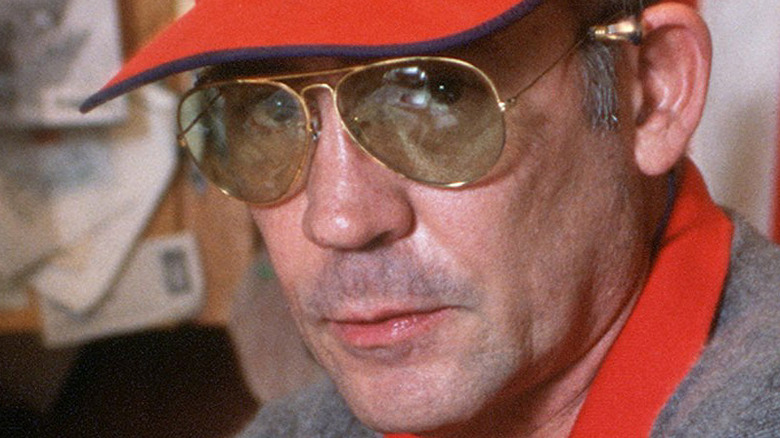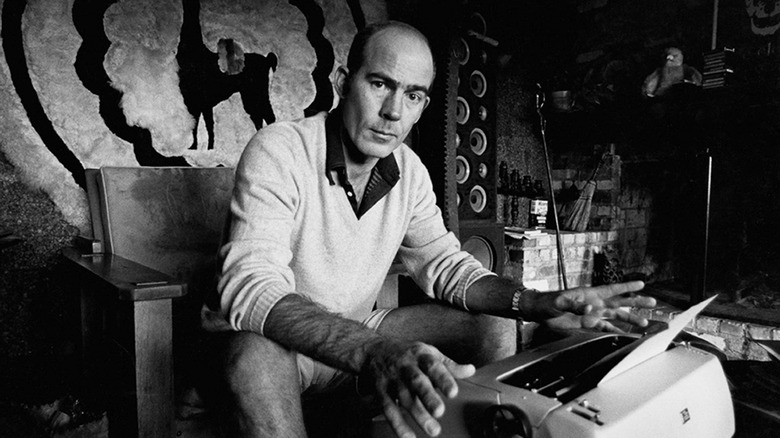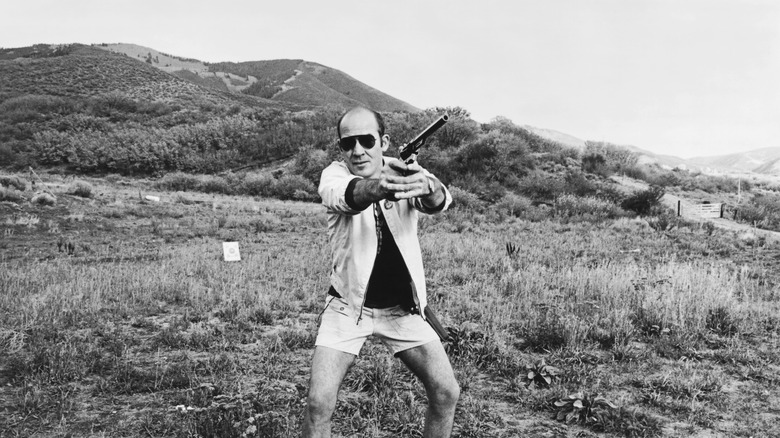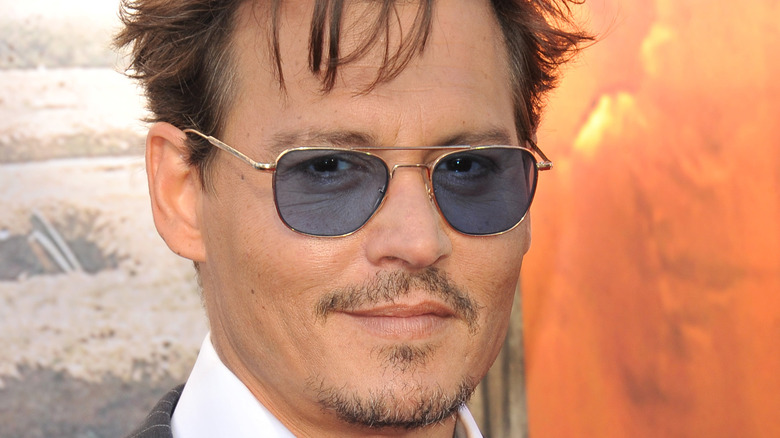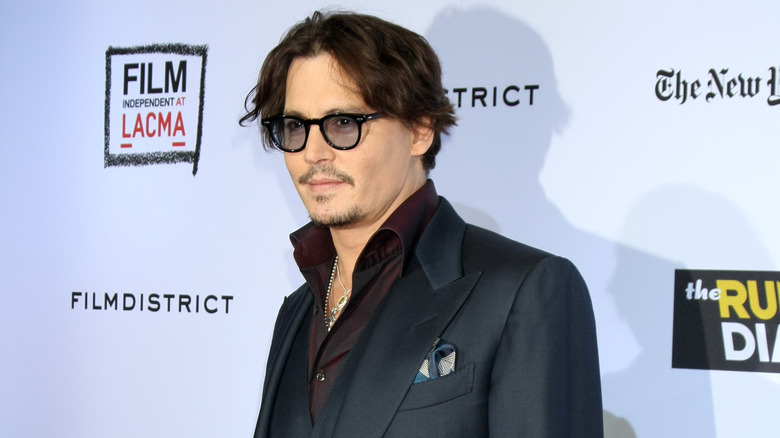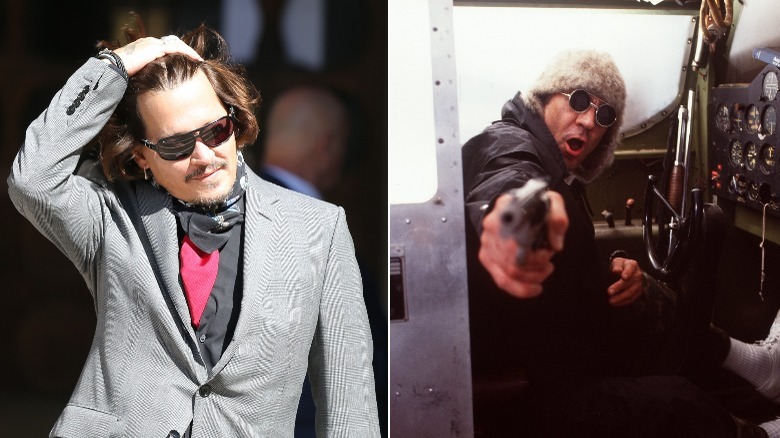Inside The Strange Friendship Of Journalist Hunter S. Thompson And Johnny Depp
Hunter S. Thompson has become something of a counter-cultural mythic figure. A sort of folk hero remembered for his affinity to firearms, all substances mind-altering, disdain for authority, and Richard Nixon. Whether that image is completely accurate, a diligently crafted facade, or something in between, it sometimes takes a front seat to the fact that Thompson was one of the most talented and influential American writers from the 1960s until his death in 2005.
The wild ways of the self-proclaimed "doctor of journalism," (per Rolling Stone) attracted fans who included a crop of Hollywood actors in the 1980s and 1990s, including Johnny Depp. The young actor and the notorious gonzo journalist, with his ever-present aviators and cigarette holder, made for an unlikely pair. But, when it came time for Thompson's most famous work — 1971's "Fear and Loathing in Las Vegas" — to get the big-screen treatment, Depp took on the role of Raoul Duke, Thompson's surrogate self. The two stayed close, and after Thompson's suicide in 2005, Depp reportedly footed the bill for the elaborate send-off Thompson had planned for himself years earlier (via the New York State Writers Institute).
The birth of Thompson's signature style
After some time spent serving in the military and hopping around the country from one small newspaper to the next, Hunter S. Thompson caught his big break when he was assigned to write an article about the Hell's Angels, but that article quickly morphed into a full-length book. According to Rolling Stone, upon its release in 1966, "Hell's Angels: The Strange and Terrible Saga of the Outlaw Motorcycle Gangs," became a hit because it gave first-hand insight into a group of people that the vast majority of journalists would be too scared to tap into. Adding to that was that Thompson's role as the author wasn't as an observer, as is typical for journalists, he was an active participant and one of the book's main characters. This combination, mixed with some substance-infused moments, launched a genre with which he became synonymous: gonzo journalism (via Biography).
After the success of the Hell's Angels book, Thompson started writing for Rolling Stone, which resulted in some of his most iconic work, including an account of his 1970 attempt to become the sheriff of Pitkin County, Colorado, where he had purchased a home. He ran on the self-created Freak Power ticket, foreshadowing his interest in politics. Then, again in 1970, Thompson wrote a first-hand account of attending the Kentucky Derby which became known as "The Kentucky Derby Is Decadent and Depraved," and, per NPR, was one of his first projects with frequent collaborator, artist Ralph Steadman.
Fear and Loathing
Two of Hunter S. Thompson's most iconic works came out in the early '70s and together they cemented both the gonzo journalism style and his status as one of America's preeminent writers. The first was 1971's "Fear and Loathing in Las Vegas" which chronicled Raoul Duke and his lawyer Dr. Gonzo — based on Thompson's actual friend Oscar Acosta, per Biography — as they spend several drug-fueled days in Vegas covering a motorcycle race. According to Rolling Stone, the assignment came courtesy of Sports Illustrated and was originally to write a few hundred words on the Mint 400 motorcycle race, but it morphed into one of the defining works of Thompson's career.
In 1980, a film loosely based on Thompson's life and career called "Where the Buffalo Roam" was released. It featured Bill Murray as Thompson and Peter Boyle as Lazlo, a character based on Oscar Acosta. The movie was inspired by Thompson's 1976 Rolling Stone Article "The Banshee Screams For Buffalo Meat" which deals with Acosta's disappearance and alleged murder (via Roger Ebert).
The film played up Thompson's wild ways, an aspect of his personality that attracted many celebrities including Jack Nicholson, John Cusack, and Sean Penn, many of whom would make the pilgrimage to Thompson's home near Aspen, Colorado — known as Owl Farm— to drink, chat, and blow things up with the father of gonzo journalism himself (via The Richest).
Johnny Depp took on the role of Hunter S. Thompson
Johnny Depp first met Hunter S. Thompson in 1994. Depp had been a fan of Thompson's work, and according to Ranker, he met Thompson at one of the writer's favorite watering holes, the Woody Creek Tavern. On that day, Thompson announced his presence by brandishing an electric cattle prod. The two became fast friends and shared quite a bit in common, not the least of which was their home state of Kentucky. Depp would later say that he felt their friendship was sealed when he used one of the writer's shotguns to blow up a propane tank strapped to nitroglycerine — feeling the ensuing fireball was a rite of passage.
By the time "Fear and Loathing in Las Vegas" was ready to hit the silver screen, Johnny Depp was a known quantity having appeared in films like "Ed Wood," "Edward Scissorhands," and "What's Eating Gilbert Grape." So, Depp was eventually tapped to star in the film adaptation of Thompson's magnum opus, but he was scared that his portrayal would affect the two's relationship. However, Thompson put him at ease, by reminding him that he was "still friends with Murray" (via Rolling Stone). Thompson also helped Depp get into character by making fun of the actor's wardrobe for the film and even helped perfect Depp's version of his own famous short, nearly bald, hair.
Johnny Depp was a major reason Hunter S. Thompson published
Johnny Depp was also one of the driving forces in convincing Hunter S. Thompson to publish a novella he had started writing decades earlier called "The Rum Diary," according to Far Out. During one of his stops earlier in his career, Thompson worked at an English-language newspaper in San Juan, Puerto Rico. His experiences there inspired him to chip away at a manuscript, however from the time he started it until the 1990s it remained tucked away and practically no one had seen it.
With Depp and Thompson becoming such good friends, the writer allowed Depp to take a look through some of his old papers and memorabilia. The actor looked through "The Rum Diary," and was clearly impressed by what he read because, according to Ranker, he was the one who convinced Thompson to publish the long-shelved novella. That wasn't Depp's only connection to the book. In 2011, six years after Thompson's death, the film adaptation of "The Rum Diary" hit theaters with Depp in the starring role.
According to Daily Record, Depp and Thompson used to occasionally go on trips together, sometimes on very short notice. "One of the things that I'll cherish all my life is whenever Hunter felt the need to wander out, he would call me and say, 'Colonel' – that's what he used to call me – 'Colonel Depp, I need you in Havana in a week,'" Depp said. "You'd spend a week in Havana with Hunter and it was madness but these memories are seared into my brain."
Johnny Depp gave Hunter S. Thompson the sendoff he wanted
In 2005, amid ailing health, Hunter S. Thompson was found dead at age 67 due to a self-inflicted gunshot wound in his Colorado home. During one of Johnny Depp's visits to Owl Farm, the discussion somehow meandered its way to what Thompson would want his memorial service to be like. Thompson told Depp that he wanted his ashes to be fired out of a cannon while "Spirit In The Sky" by Norman Greenbaum and "Mr. Tambourine Man" by Bob Dylan were blasted out of speakers.
According to Far Out, Depp helped pay for the funeral service his friend always wanted, which was believed to cost around $3 million. Thompson's ashes were fired out of a cannon that stood over 150 feet tall and was shaped like the "gonzo fist" symbol often associated with him; a two-thumbed fist gripping a peyote button. The private service was then capped off by fireworks. In attendance were many of Thompson's celebrity friends as well as politicians like Senators John Kerry and George McGovern, per the New York State Writers Institute.
Depp explained why it was important to make the service a reality. "All I'm doing is trying to make sure his last wish comes true," the actor said according to Far Out. "I just want to send my pal out the way he wants to go out."
